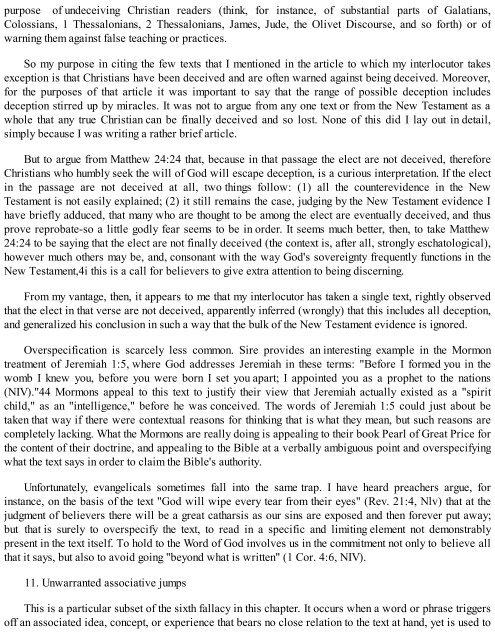Exegetical Fallacies - D. A. Carson
Exegetical Fallacies - D. A. Carson
Exegetical Fallacies - D. A. Carson
Create successful ePaper yourself
Turn your PDF publications into a flip-book with our unique Google optimized e-Paper software.
purpose of undeceiving Christian readers (think, for instance, of substantial parts of Galatians,<br />
Colossians, 1 Thessalonians, 2 Thessalonians, James, Jude, the Olivet Discourse, and so forth) or of<br />
warning them against false teaching or practices.<br />
So my purpose in citing the few texts that I mentioned in the article to which my interlocutor takes<br />
exception is that Christians have been deceived and are often warned against being deceived. Moreover,<br />
for the purposes of that article it was important to say that the range of possible deception includes<br />
deception stirred up by miracles. It was not to argue from any one text or from the New Testament as a<br />
whole that any true Christian can be finally deceived and so lost. None of this did I lay out in detail,<br />
simply because I was writing a rather brief article.<br />
But to argue from Matthew 24:24 that, because in that passage the elect are not deceived, therefore<br />
Christians who humbly seek the will of God will escape deception, is a curious interpretation. If the elect<br />
in the passage are not deceived at all, two things follow: (1) all the counterevidence in the New<br />
Testament is not easily explained; (2) it still remains the case, judging by the New Testament evidence I<br />
have briefly adduced, that many who are thought to be among the elect are eventually deceived, and thus<br />
prove reprobate-so a little godly fear seems to be in order. It seems much better, then, to take Matthew<br />
24:24 to be saying that the elect are not finally deceived (the context is, after all, strongly eschatological),<br />
however much others may be, and, consonant with the way God's sovereignty frequently functions in the<br />
New Testament,4i this is a call for believers to give extra attention to being discerning.<br />
From my vantage, then, it appears to me that my interlocutor has taken a single text, rightly observed<br />
that the elect in that verse are not deceived, apparently inferred (wrongly) that this includes all deception,<br />
and generalized his conclusion in such a way that the bulk of the New Testament evidence is ignored.<br />
Overspecification is scarcely less common. Sire provides an interesting example in the Mormon<br />
treatment of Jeremiah 1:5, where God addresses Jeremiah in these terms: "Before I formed you in the<br />
womb I knew you, before you were born I set you apart; I appointed you as a prophet to the nations<br />
(NIV)."44 Mormons appeal to this text to justify their view that Jeremiah actually existed as a "spirit<br />
child," as an "intelligence," before he was conceived. The words of Jeremiah 1:5 could just about be<br />
taken that way if there were contextual reasons for thinking that is what they mean, but such reasons are<br />
completely lacking. What the Mormons are really doing is appealing to their book Pearl of Great Price for<br />
the content of their doctrine, and appealing to the Bible at a verbally ambiguous point and overspecifying<br />
what the text says in order to claim the Bible's authority.<br />
Unfortunately, evangelicals sometimes fall into the same trap. I have heard preachers argue, for<br />
instance, on the basis of the text "God will wipe every tear from their eyes" (Rev. 21:4, Nlv) that at the<br />
judgment of believers there will be a great catharsis as our sins are exposed and then forever put away;<br />
but that is surely to overspecify the text, to read in a specific and limiting element not demonstrably<br />
present in the text itself. To hold to the Word of God involves us in the commitment not only to believe all<br />
that it says, but also to avoid going "beyond what is written" (1 Cor. 4:6, NIV).<br />
11. Unwarranted associative jumps<br />
This is a particular subset of the sixth fallacy in this chapter. It occurs when a word or phrase triggers<br />
off an associated idea, concept, or experience that bears no close relation to the text at hand, yet is used to



